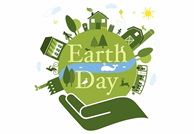Lions, and tigers, and bears, oh my!
Bees, and giraffes, and elephants, oh my!
Whales, and leopards, and bison, oh my!
Monkeys, and birds, and rhinos, oh my!

Today is Earth Day. As we mark Earth Day this year, the number of species in decline globally is growing exponentially. Environmental scientists warn that we are amidst the largest period of species extinction in the last 60 million years. Through the ages of our biosphere, between one and five species go extinct annually. Today, scientists estimate that we are now losing species at over 1,000 times the normal rate, with multiple extinctions happening daily. Species are disappearing from our planet even before we can learn about them or the benefits they bring to our environment.
Habitat destruction, exploitation, and climate change are driving the loss of half of the world’s wild animal population. Of the world’s 504 primate species close to 60% are threatened with extinction, and 75% of primate species are in severe population decline. Of the world’s bird species 40% are in decline, and 1 in 8 is threatened with global extinction. A recent study projects that if the current decline in lizard populations continues, 40% of all lizard species will be extinct by 2080.
Across the globe, more than 650,000 marine mammals are trapped by, or seriously injured by, fishing gear annually. Over the past 20 years, around 75% of all toothed whale species, such as dolphins, porpoises, and 65% of baleen whale species (humpback, blue), and 65% of pinniped species (sea lions) have been affected through bycatch in fishing operations globally.
Rabbi Samson Raphael Hirsch, writing in the first half of the nineteenth century, articulated an understanding of the nature of creation as well as our role in the world.
“It was not with just one word, one summons of creation, that the Almighty brought this world into being, the whole of it and every detail; for if it had been created in this manner, everything would be directly dependent upon G-d’s Word for its existence, life, and functioning. Instead, He called forth His world into existence in ten stages; He created an abundance of forces, intermingled and functioning closely together, according to His Word – and then He separated them, so that each had to sustain the other: none was henceforth able to exist and function by itself, but had to be sustained by its fellow creatures and, in turn, had to help them exist and function. In this way everything contributes according to its strength, however much or little, to the existence of the whole; and if it destroys a fellow creature, it robs itself of what it needs for its own existence.”
The Nineteen Letters – Letter Three
Hirsch expresses an essential truth about our interdependence with all of creation’s diversity, the vital function of each element therein, and the potential for self-inflicted harm. Hirsch’s exhortation should be our watchword as we witness the massive impact that human beings have on our collective home. Fossil fuels (oil, coal, and natural gas) are burned as a result of things we do every day to eat, travel, and live in our homes. Greenhouse gases, such as carbon dioxide, nitrous oxide and methane, are released by the burning of those fossil fuels.
The first stanza of a Talking Heads song ends with, “I’m an ordinary guy (Pause) Burning down the house.” We are each of us ordinary individuals, going about our ordinary activities, and simultaneously feeding the fire that is burning down our global house. One of the unexpected discoveries made during the recent global pandemic was how quickly and significantly our more limited use of fossil fuels allowed for environmental healing. The periods of necessary shutdown highlighted both the impact we have on the earth and that it still has an incredible ability to heal.
This year, Earth Day serves as a segue to our celebration of Pesach, the Festival of the Spring, with its many associations to the annual renewal of nature.1 Just as we gain new insights from our yearly engagement with the Haggadah which add to our Jewish identity, so too, our post-pandemic world demands that we internalize all the lessons learned regarding what we value most and what we need to prioritize in all our relationships, including our relationship with Mother Earth.
Chag Sameyach –
Rabbi David M. Eligberg
1 The familiar Karpas dipping of a green vegetable into salt water resonates on multiple levels. The green is a symbol of spring, the salt water, a symbol of the tears of sadness of our ancestors. The dipping is also a bringing together of the land and the sea, a reminder of the interconnectedness of our world.
This idea even finds expression toward the end of the first Aquaman movie when Aquaman’s mother, Queen Atlanna tells her other son Orm, “Your father taught you that there are two worlds. He was wrong. The land and the sea are one.”
Copyright © 2024 Rodef Sholom Temple. All rights reserved. Website designed by Addicott Web.